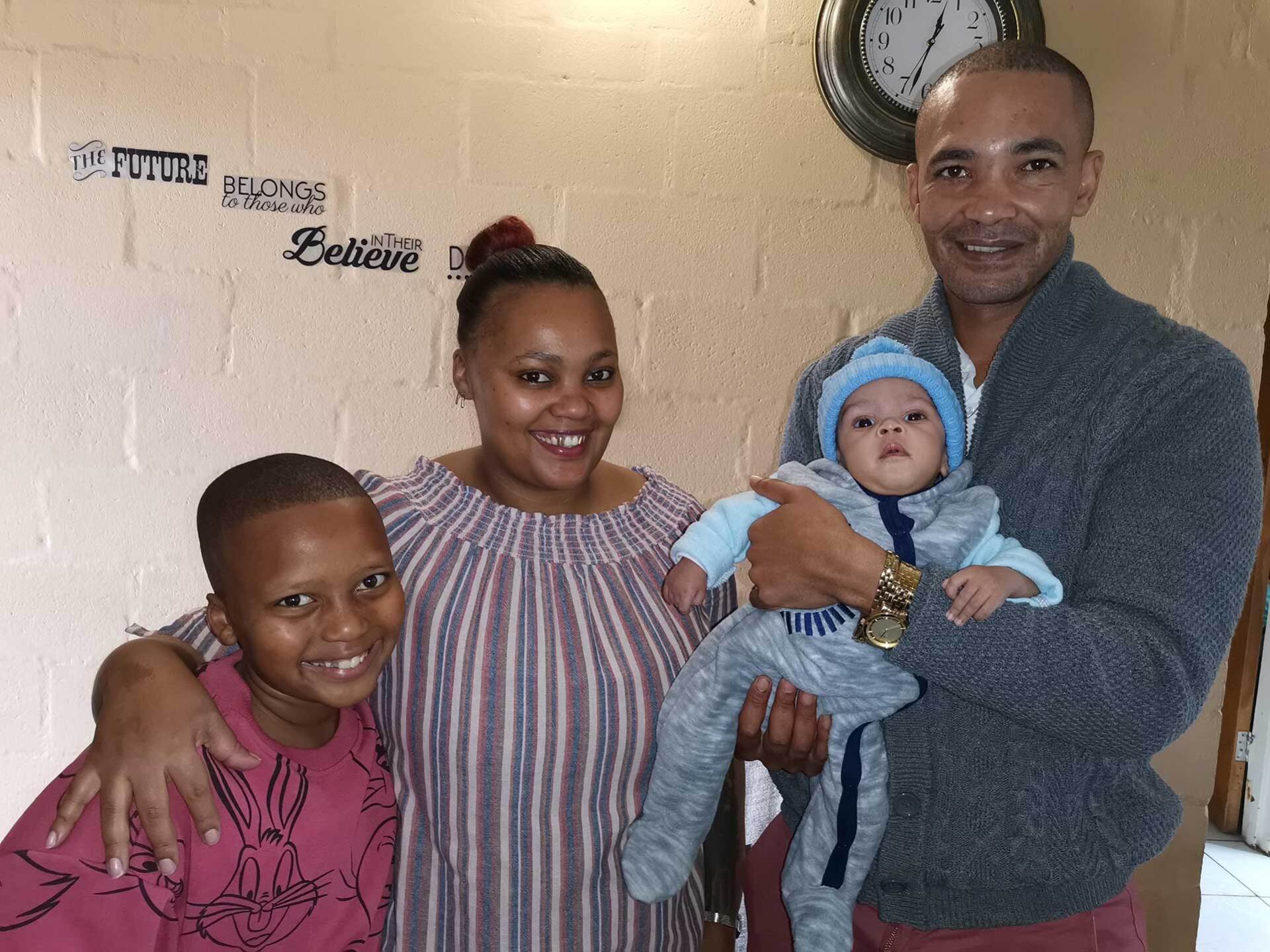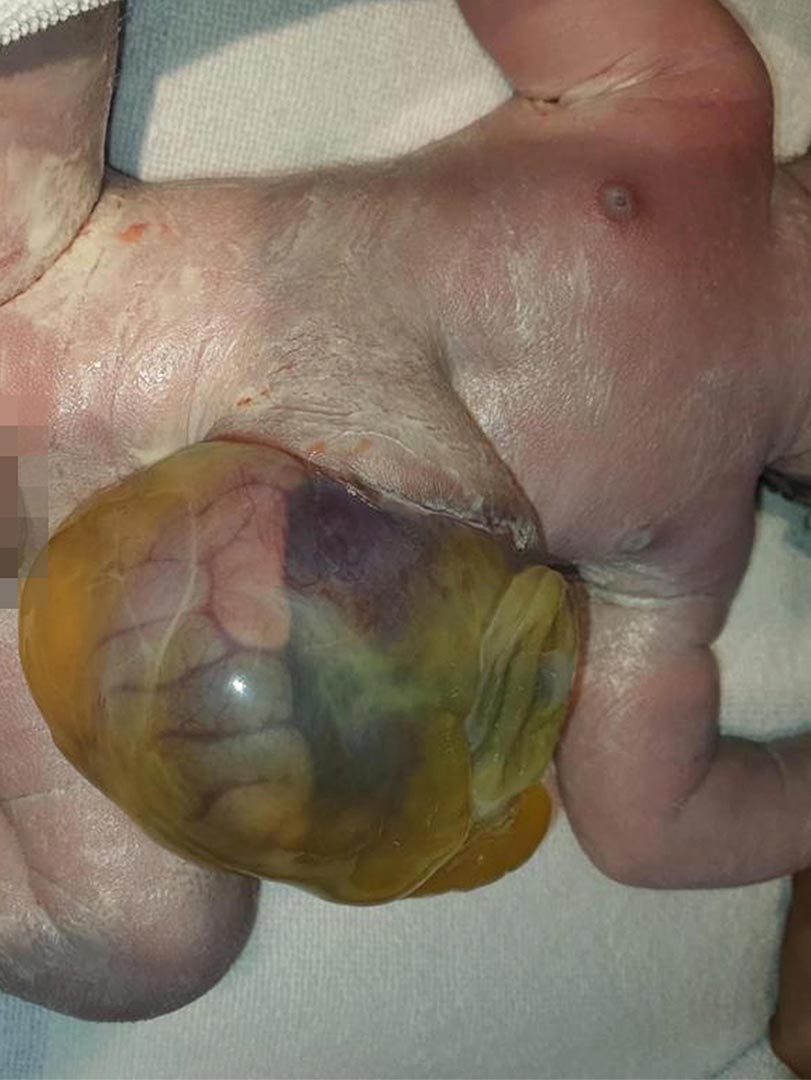“Don’t worry, Mommy, I’m fine…”
After just over 100 days in the neonatal intensive care unit at Netcare Blaauwberg Hospital, Baby Ephraim Maleho is now thriving at home with his family: (left to right) big brother Llyle, mother Beneline, and father Melvory holding little Ephraim.
Parents and medical team refuse to give up on Baby Ephraim
Born with his intestines and half his liver protruding from his body in a translucent ‘bubble’, few could have imagined that baby Ephraim Maleho could survive – but his parents and medical team at Netcare Blaauwberg Hospital refused to give up on him. After some three months of painstaking, advanced neonatal intensive care, including an ingenious technique involving the use of amniotic tissue saved from his birth, the baby boy is now thriving at home with his family.
‘How can our child live?’
“At the 13-week ultrasound scan of my pregnancy, the doctor picked up something unusual about the baby. We found out that some of his internal organs were developing outside his body, a condition known as exomphalos,” says Ephraim’s mother, Beneline Maleho.
“We wondered, how can our child live? Ephraim’s father and I knew there is something special about this child, and even though there were major risks, we would stop at nothing to give him the chance to live. I thanked God every day when I opened my eyes and I felt the baby kicking. It was like he was saying, ‘Don’t worry, Mommy, I’m fine’.”
“Ephraim’s birth was powerfully emotional,” Ephraim’s father, Melvory van Wyk, recalls. “We were so relieved that he had survived, but the neonatal intensive care team needed to stabilise him and he was immediately taken to the neonatal intensive care unit [NICU] so we were very worried, and we knew it was the start of a long journey. Beneline told me she was okay, and that I should follow the medical team to be with our son.”
Exomphalos is a defect in the central abdomen, resulting in a sealed sack outside the body containing some of the abdominal organs, resembling a bubble with the organs clearly visible. “What made Ephraim’s lesion particularly unusual was not only its size, but the fact that not only the small and large intestines but also half of his liver were protruding through his abdominal wall within this translucent bubble, redefining this lesion as a hepato-omphalocele,” explains Dr Ricky Dippenaar, principal neonatologist practising at Netcare Blaauwberg Hospital.
“Our biggest challenge was that as a result of all of those contents being outside his body, his abdominal cavity had not developed. His intestines and organs could not simply be moved into the position they would usually be in, we needed time for the skin to grow to make enough space in his tummy.”
So began a long and extremely delicate process during which Ephraim was kept in a carefully controlled environment within the NICU to protect the thin membrane forming the bubble around his organs and to prevent infection. “Crucial to the process was maintaining this membrane, which was completely transparent initially, as it matured and gradually contracted,” Dr Dippenaar explains.
Amniotic tissue: natural healing power from mother
During this process, the membrane started to break down in two areas, putting Ephraim at risk for life-threatening septic complications. This is where the amniotic sac, which Dr Dippenaar had carefully preserved at Ephraim’s birth, became a crucial part of his highly specialised treatment. The amniotic sac is a clear tough membrane formed inside the mother’s uterus to encapsulate the growing unborn baby and amniotic fluid.
“Dr Dippenaar must be applauded for anticipating the need to preserve the amniotic tissue at the time of the caesarean section, as this extra tissue containing stem cells undoubtedly saved little Ephraim,” says Dr Beelke D’hondt, a paediatric surgeon and member of the dedicated NICU team at Netcare Blaauwberg Hospital who had been caring for Ephraim since his birth.
“This amniotic ‘sheet’ was used by Dr Dippenaar and I on two occasions where any other treatment modality would have proven to be insufficient to prevent infection and buy time to let the abdominal cavity grow and the skin to creep over the ventral abdominal defect.
“Ephraim’s case was very challenging but his progress has been remarkable, and the classical treatment modalities would most likely not have allowed us to achieve such good results. This is a new advance in treatment modalities, supporting the feasibility of amniotic tissue for specialised neonatal grafting in circumstances such as this, and might need to be considered as temporary graft in other congenital disorders,” she says.
“It just seemed logical to use the very membrane that protected baby Ephraim inside the womb as a natural barrier. This membrane is known to contain a number of healing cytokines and essential growth factors and help reduce pain. It also has anti-bacterial properties, as well as reducing inflammation and scar tissue,” Dr Dippenaar adds.
Rapid progress and home
“The amniotic tissue incorporated well, reinforcing the bubble of tissue around Ephraim’s organs, which then underwent a transformation and started contracting. Together with the constricting dressing, the bubble reduced dramatically, gently squeezing the organs into his abdomen, and allowing Ephraim’s abdominal cavity to expand,” he says.
After two months, the cavity was large enough to fit all Ephraim’s organs safely inside and the external sac had shrunk to resemble “a tiny rhino horn, tough, firm and providing total protection”. At last, at the optimal point, he was ready for surgery and Dr D’hondt, together with plastic and reconstructive surgeon Dr Alexander Zühlke, performed the intricate procedure to close Ephraim’s abdominal wall, with all his organs in their correct place.
“The surgery was interesting and multifaceted but proved to be very feasible and successful. Ephraim showed us what it is to be a little hero. The anesthesia was led by two experienced pediatric anaesthetists. Thanks to their excellent knowledge and skills and guided by cerebral and renal oximetry, Ephraim remained stable without even a hint of noticeable operative challenge,” Dr D’hondt adds.
“During his time in the NICU, before and after his major surgical intervention, no effort was spared to ensure Ephraim was kept entertained and well stimulated. He was offered an amazing neurodevelopmental path for those crucial first months. The neonatal ICU staff and all the individuals involved in caring for him, not least Dr Dippenaar, are dedicated and allowed Ephraim to have a holistic experience of optimal clinical and psychological care; they all did an amazing job,” Dr D’hondt says.
Despite experiencing some initial difficulty in feeding, Ephraim was growing and made an excellent recovery after this surgery, and was soon ready to go home with his family. “We were ecstatic when Ephraim was finally ready to be discharged. The NICU team gave me special training and support so we could be confident caring for him at home, as he needed to be fed through a feeding tube at first,” Beneline says.
“We were all surprised how well he started feeding when he was back home, he gained weight quickly and very soon we no longer needed to feed him with the nasogastric tube. Dr Ricky [Dippenaar] said, ‘You see, that’s the miracle a mother can do’.”
Ephraim’s father expressed the family’s appreciation to Dr Dippenaar, the other specialists and the NICU team, particularly Sr Kelly Delaney, for their efforts in bringing Ephraim safely through his first critical months.
“We thank God for sending these angels to look after our son. They were open about the risks, and supported us to make the necessary decisions for our son informed by the facts. We want other families to know that there are people who understand what it is like to go through a difficult journey like we had with Ephraim, and that there is hope. He is our little miracle warrior,” Melvory concludes.















